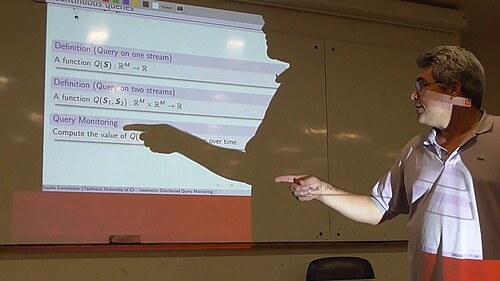Geometric Distributed Query Monitoring
Vasilis Samoladas is an associate professor at the School of ECE of the Technical University of Crete
Wednesday, 30/5/2018, 1pm, 145.Π.58
Abstract: During the so-called happy scaling era of integrated circuits, the increasing transistor count per unit area and the increasing energy-efficiency were able to offset the ever-increasing complexity of communications and digital signal processing algorithms. Unfortunately, the gains from circuit technology scaling have slowed down significantly in the last few years. In this talk, I will discuss some ways to ensure that the progress of the last decades is maintained, ranging from classical algorithm/hardware co-design to more interdisciplinary approaches. More specifically, I will first discuss the hardware implementation of successive cancellation list decoding and successive cancellation flip decoding of polar error-correcting codes (ECC), which were recently included in the next-generation 5G standard for wireless communications. I will then examine the use of approximate computing techniques to increase the throughput and energy-efficiency of ECC decoders. Finally, I will present the application of tools from information theory and machine learning to the design of Terabit/s ECC decoders and non-linear self-interference cancellation in full-duplex radios, respectively.
Brief CV: Vasilis Samoladas is an associate professor at the School of ECE of the Technical University of Crete. His interests lie in the design and analysis of data structures and algorithms for geometric problems and applications.
Recording




